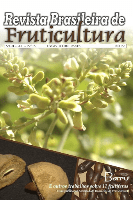
Revista Brasileira de Fruticultura
metrics 2024
Showcasing Excellence in Brazilian Horticultural Science
Introduction
Revista Brasileira de Fruticultura, published by the Sociedade Brasileira de Fruticultura, is a leading scholarly journal dedicated to the advancement of research in the fields of agronomy, crop science, food science, horticulture, and plant science. With an impressive Open Access model adopted since 2001, the journal is committed to disseminating high-quality research from Brazil and beyond, promoting innovation and collaboration among researchers, professionals, and students alike. The journal currently holds a respectable Q3 category ranking in multiple fields as of 2023, reflecting its significance within the scientific community, specifically ranked #72 in horticulture and #257 in agronomy, among its peers. The Revista Brasileira de Fruticultura not only serves as a platform for original research articles, reviews, and case studies but also emphasizes practical applications and sustainable practices in fruit cultivation. Its aim is to enhance the visibility of Brazilian fruit research on a global scale, making it an invaluable resource for those invested in advancing horticultural sciences.
Metrics 2024
 0.24
0.24 0.90
0.90 1.00
1.00 38
38Metrics History
Rank 2024
Scopus
IF (Web Of Science)
JCI (Web Of Science)
Quartile History
Similar Journals
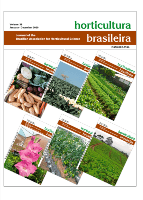
Horticultura Brasileira
Fostering collaboration for a greener tomorrow.Horticultura Brasileira is a leading open access journal published by the ASSOC BRASILEIRA HORTICULTURA, dedicated to advancing research in the fields of horticulture, plant science, and soil science. With an ISSN of 0102-0536 and an E-ISSN of 1806-9991, this journal has been an integral part of the scientific community since its inception, embracing open access practices since 1999. Based in Brazil, it provides a platform for researchers to disseminate their findings and contribute to the growing body of knowledge in horticultural science and related disciplines. Despite its current Q3 ranking in multiple categories such as Horticulture, Plant Science, and Soil Science within Scopus, the journal continues to attract a diverse array of scholarly articles, fostering innovation and collaboration among scientists. The journal aims to bridge the gap between research and practical applications, making it an invaluable resource for students, professionals, and academics alike who are looking to expand their understanding and impact in the field.
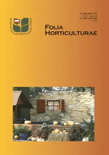
Folia Horticulturae
Connecting Researchers to the Heart of Horticulture.Folia Horticulturae, an esteemed journal in the field of Horticulture, serves as a pivotal platform for the dissemination of innovative research and developments within agricultural and biological sciences. Published by SCIENDO, this open-access journal has been contributing to the global scientific community since 2004, ensuring that key findings are freely accessible to researchers, professionals, and students alike. Based in Poland, the journal boasts an impressive Q2 ranking in Horticulture, indicating its solid impact and significance in the field, with a Scopus rank of #32 out of 115, placing it in the 72nd percentile. With a commitment to fostering scientific discourse, Folia Horticulturae actively encourages contributions that explore various aspects of horticultural science, from crop management to sustainability practices. This initiative not only enhances knowledge but also advances practical applications, making it an invaluable resource for anyone interested in the intricacies of horticulture.
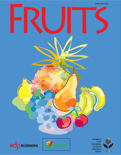
Fruits
Exploring the Science of Fruits for a Sustainable Future.Fruits, published by the International Society for Horticultural Science (ISHS), is a pivotal journal in the fields of Agronomy, Food Science, and Horticulture. Since its inception in 1995 and with a continued publication from 2001 to 2024, this journal provides a platform for innovative research and advancements related to fruit science, covering an array of topics from cultivation techniques to post-harvest processing. With an ISSN number of 0248-1294 and an E-ISSN of 1625-967X, *Fruits* engages a global audience, operating out of France and serving as a vital resource for academics, industry professionals, and students alike. Despite its current categorization as Q4 in Agronomy and Crop Science and Q3 in both Food Science and Horticulture, the journal is committed to fostering high-quality research and enhancing its visibility within the academia, as reflected in its Scopus rankings. Readers can expect rigorous peer-reviewed articles that contribute significantly to the understanding of fruit-related science, ultimately driving the advancement of sustainable practices in the field. Emphasizing accessibility, while currently not open access, *Fruits* remains dedicated to disseminating valuable knowledge to enhance the communal pursuit of excellence in horticultural research.
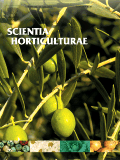
SCIENTIA HORTICULTURAE
Innovating today for a greener tomorrow in horticulture.SCIENTIA HORTICULTURAE, published by Elsevier, is a leading journal in the field of horticulture, with an impressive impact factor reflected in its Q1 ranking (2023) and position as #6 out of 115 in the Scopus category for Agricultural and Biological Sciences. This journal plays a pivotal role in disseminating cutting-edge research and innovations in horticultural science and technology, contributing significantly to the understanding of plant cultivation, production, and management. With continuous publication since 1973, SCIENTIA HORTICULTURAE offers an essential platform for researchers, professionals, and students alike who are focused on the advancement of sustainable horticultural practices. Although it is not an open-access journal, it provides a wealth of data and findings that can be accessed through institutions and libraries. Located in the Netherlands at RADARWEG 29, 1043 NX AMSTERDAM, this journal remains an invaluable asset to the global horticultural community throughout its converged years, fostering collaboration and elevating standards in horticulture research.

Acta Scientiarum Polonorum-Hortorum Cultus
Connecting Researchers for a Greener Tomorrow.Acta Scientiarum Polonorum-Hortorum Cultus is a notable open-access journal dedicated to the field of horticultural science, published by UNIV LIFE SCIENCES LUBLIN in Poland. Since its inception in 2002, it has aimed to disseminate high-quality research findings, innovative methodologies, and advancements in the horticultural sector. The journal is indexed in Scopus and has ranked in the 33rd percentile for Horticulture and the 25th percentile for Plant Science, indicating its growing influence and relevance within the scientific community. Despite the challenges presented in quartile categorizations, Acta Scientiarum Polonorum maintains a commitment to cultivating knowledge and fostering collaboration among researchers, professionals, and students in the agricultural and biological sciences. With its publication timelines spanning from 2008 to 2024, the journal serves as a vital resource for those interested in the latest horticultural trends, sustainable practices, and scientific inquiries that drive the field forward.
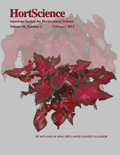
HORTSCIENCE
Exploring the forefront of horticultural research.HORTSCIENCE is a prestigious journal published by the American Society for Horticultural Science, focusing on the latest research and developments in the field of horticulture. With an ISSN of 0018-5345 and an E-ISSN of 2327-9834, this journal has established itself as a vital resource for horticultural scientists, practitioners, and educators since its inception. As of 2020, it has embraced an Open Access model, promoting the dissemination of scientific knowledge and enabling wider accessibility to its rich content. HORTSCIENCE currently holds a Q2 ranking in the Horticulture category for 2023, placing it in the top tier of its field with a Scopus rank of 36 out of 115 in the area of Agricultural and Biological Sciences. This journal publishes empirical research, significant advancements, and comprehensive reviews that contribute to the understanding and improvement of horticultural practices, making it an essential publication for anyone involved in horticultural research or education.

EUROPEAN JOURNAL OF HORTICULTURAL SCIENCE
Nurturing sustainable practices in the world of horticulture.The European Journal of Horticultural Science, an esteemed publication of the International Society for Horticultural Science (ISHS), serves as a pivotal platform for advancing the field of horticulture since its inception in 2003. With its base in Germany, this journal occupies a significant position in the Q3 quartile of horticultural research, confidently ranked #60 out of 115 in the Agricultural and Biological Sciences category on Scopus, reflecting its relevance and impact within the scholarly community. The European Journal of Horticultural Science fosters open access to a wealth of research and insights, facilitating knowledge sharing among researchers, professionals, and students dedicated to the innovative and sustainable practices in horticultural science. As it embarks on a new chapter through its convergence years leading up to 2024, the journal aims to enhance the dialogue on contemporary horticultural challenges and advancements, making it an essential resource for those seeking to contribute to and learn from ongoing developments in this vital field.

Horticulturae
Empowering Global Access to Horticultural Insights.Horticulturae, an esteemed open-access journal published by MDPI, is at the forefront of horticultural science, showcasing innovative research and advancements in the field since its inception in 2015. With its base in Switzerland, this journal operates under the ethos of global accessibility, allowing researchers, professionals, and students to share and disseminate critical findings without barriers. Horticulturae holds a distinguished Q1 ranking in Horticulture and Q2 in Plant Science, as reported in the 2023 categorizations, highlighting its impactful contributions to the scientific community. The journal features rigorous peer-reviewed articles covering a wide range of topics, including plant physiology, crop production, and sustainable practices, making it a vital resource for anyone engaged in gardening, agronomy, and environmental science. As it converges its focus from 2015 to 2024, Horticulturae not only aims to further academic discourse but also aligns with the growing need for research pertaining to biodiversity and sustainable agriculture, thus ensuring relevance in an ever-evolving field.
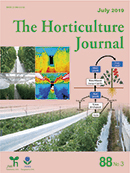
Horticulture Journal
Transforming Horticultural Research into PracticeThe Horticulture Journal, published by the Japan Society for Horticultural Science, is a leading academic platform dedicated to the advancement of horticultural research and practices. With an ISSN of 2189-0102 and an E-ISSN of 2189-0110, this journal endeavors to publish high-quality research that emphasizes innovative techniques, sustainable practices, and the science of plant cultivation. The journal has been recognized for its impact within the field, currently holding a Q2 ranking in Horticulture and a Q3 ranking in Plant Science as of 2023, indicating its significant contribution to advancing knowledge. With its open-access model, researchers, professionals, and students have the opportunity to engage with the latest findings, thanks to the journal's commitment to widespread dissemination of information. Since its convergence period began in 2015 and continuing through to 2024, the Horticulture Journal remains instrumental in promoting sustainable and beneficial practices in horticulture science globally.
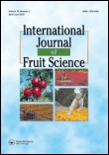
International Journal of Fruit Science
Uncovering critical insights in fruit science.International Journal of Fruit Science, published by TAYLOR & FRANCIS INC, is a preeminent platform for the dissemination of high-quality research in the fields of Agronomy, Horticulture, Ecology, and Plant Science. With an impressive track record since its inception in 2005 and ongoing convergence up to 2024, this journal serves as a vital resource for scholars and industry professionals alike. Renowned for its rigorous peer-review process and comprehensive publication of cutting-edge studies, it holds a distinguished position in multiple Scopus rankings, including a top 10 placement in Horticulture (Rank #8/115) and notable percentiles, reflecting its significant impact in the academic community. Researchers can delve into critical insights related to fruit cultivation, genetics, and sustainability, bolstered by its Q1 and Q2 quartile standings across various categories. Though the journal is not open access, it remains an essential read for those intent on advancing knowledge and practices within the rapidly evolving landscape of fruit science.